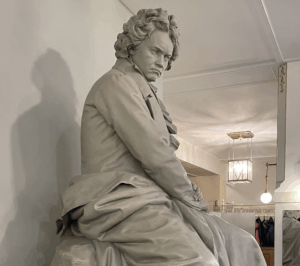Introduction
Franz Schubert was one of the most famous Austrian composers of the late Classical and early Romantic eras. His works are widely regarded as some of the most loving and soul-touching, often depicting love and passion.
Even though his music is full of love and joy, Schubert himself remained single during his short life. He never had a documented spouse or marriage and died at the young age of 31, even younger than Chopin or Mozart.
Despite his short life, Schubert was an extremely prolific composer, author of 9 symphonies, 21 sonatas, numerous string and piano quartets, and over 600 lieder!
But why didn’t he have any romantic relationships? Was it because of his non-traditional orientation, or was he simply too shy around women? Today, we’ll finally answer the question: Was Schubert gay, or was he just a lonely wolf?
Schubert’s Social Life
Despite having influential friends and many admirers, Franz Schubert remained poor and unsuccessful as a public performer. Born into a poor Austrian family, he had to share everything with 14 siblings from a young age.
As a result, he had to provide for himself to afford food and housing. Being only 5 feet tall and quite weak from childhood, he wasn’t popular among women like Mozart or Liszt. However, this doesn’t mean he wasn’t interested in girls in his younger years.
Schubert was a well-known musician and composer in Vienna and maintained an active social life. He had many friends among Austrian singers and musicians and several female pupils with whom he shared close friendships.
One of these pupils was Karolina Esterházy, the daughter of an Austrian nobleman. She had connections with Beethoven and other famous Austrian artists. Schubert and Karolina often practiced piano pieces together, particularly his works for four hands. Many of these pieces included parts where hands had to intersect, creating moments of intimacy during their playing.
Schubert also sought women’s attention at public gatherings. As a talented musician, he traveled a lot, forming new connections. In one of his letters, he described his recent trip:
“In the house, there are 8 young girls, and they are all very pretty. You can see that I have enough to do here…”
Maybe Schubert wasn’t always seen by women as a romantic partner, but his warm feelings and interest in the opposite sex are no doubt.
“Schubertians” and Schubert’s Love Letters
Schubert was a central figure in a men-only club known as the “Schubertians,” made up of his fans and admirers. This group included young authors, poets, and musicians who would gather to sing his latest lieder and listen to piano sonatas. Naturally, some of Schubert’s closest friends were part of this group.
As a result, there’re many of Schubert’s letters addressed to some members of this club left today. Some of these letters are quite sincere and intimate. The best examples are written to his friend, the young Austrian poet Johann Mayrhofer.
Mayrhofer was almost ten years younger than Schubert, and they shared a room for two years. He wrote texts for several of Schubert’s songs, and their relationship was notably close. Schubert often opened up to the young poet, describing his despair and expressing how much he valued their friendship. Additionally, there’s evidence Mayrhofer may have been gay himself.
Another close friendship was with Anselm Hüttenbrenner, to whom Schubert dedicated his famous Trout Quintet and other works. In one letter, Schubert wrote:
“As a proof of sincerest friendship, I am sending you yet another song, which I have just written at midnight at Anselm Hüttenbrenner’s. I wish that we could pledge our friendship in a glass of punch!”
— Schubert to Hüttenbrenner, 21.02.1818
While the Schubertians were an all-male group and Schubert maintained strong ties with his male friends, there is no proof of romantic or sexual relationships with men. His sincere friendships likely came from his low social status and lack of wealth. As a result, his friends were incredibly valuable to him.
Schubert and Women
Schubert lived his life unmarried and without any serious relationships with women. His friends didn’t notice any clear romantic connections with other young ladies. As a result, some scholars speculate about his sexuality.
However, Schubert’s relationship with women is a more complex topic. While he was not married or attached to any particular woman, he was likely attracted to several of them.
For instance, he was likely drawn to previously mentioned Karolina Esterházy, to whom he dedicated several works. Additionally, many of his songs are about love between a man and a woman. Famous examples include Gretchen am Spinnrade and Die schöne Müllerin, which show Schubert’s despair in finding his own love.
Schubert’s life was cut short at 31 due to several illnesses, including syphilis. He likely contracted it from a female prostitute later in life. His struggles with illness influenced much of his later works, such as the Winterreise song cycle and his last three piano sonatas. This period was the hardest for Schubert but it also led his eternal masterpieces.
Schubert often expressed his views on love and women. In 1816, in one of his notes, he wrote:
“Happy is the man who finds a true friend in his life. Even happier is he who, in his wife, finds a true lady friend.”
These particularly soul-touching words make sense, as Schubert often felt lonely and depressed.
Schubert’s Homosexuality in His Music
Some scholars believe Schubert may have had secret sexual attractions to men. While there is no clear evidence, some biographers point to his letters as potential proof.
Susan McClary, a prominent Schubert biographer, argues that Schubert’s homosexuality is reflected in his famous 8th Unfinished Symphony. According to her, the second movement contains passages that represent his struggle with his sexuality and feelings of self-doubt.
Another Schubertian, Solomon Horowitz, suggests that Schubert’s syphilis and letters to male friends indicate his attraction to men. One of the examples is Gretchen am Spinnrade. In it, Schubert wrote:
“My peace is gone,
My heart is heavy,
I find it never
And never again.”
While some of his lieder are interpreted as some sort of homosexual fantasies, it’s not enough to claim Schubert was part of the LGBT community. Instead, they reflect his inner conflict and personal struggle with love.
Summary
Whether Schubert was gay or not is a widely debated topic among his biographers and musicians. While some, like Solomon Horowitz and Susan McClary, argue that he was secretly gay, others, like András Schiff, deny this.
After analyzing his letters, songs, and music, there’s no strong proof of Schubert’s homosexuality as there’s no direct evidence of relationships between him and other men.
His lack of relationships with women can likely be explained by his self-doubt and personal struggles, which made him shy and reserved.
This wasn’t uncommon among famous artists. Beethoven, Chopin, and even Liszt were never married, and some of them never experienced true romantic love.
Whether or not Schubert’s sexual orientation is discussed, it doesn’t make him better or worse composer. What we know for sure is that Schubert had a tough and short life. He wrote much about love but never experienced it fully himself.
This struggle led to the deep meaning in many of his masterpieces—something joyful, always positive people are not able to express. Despite his personal difficulti, he stayed socially active and didn’t withdraw from the world.
Even though he wasn’t as famous during his lifetime as he is now, Schubert is now celebrated as one of the greatest Romantic composers.






